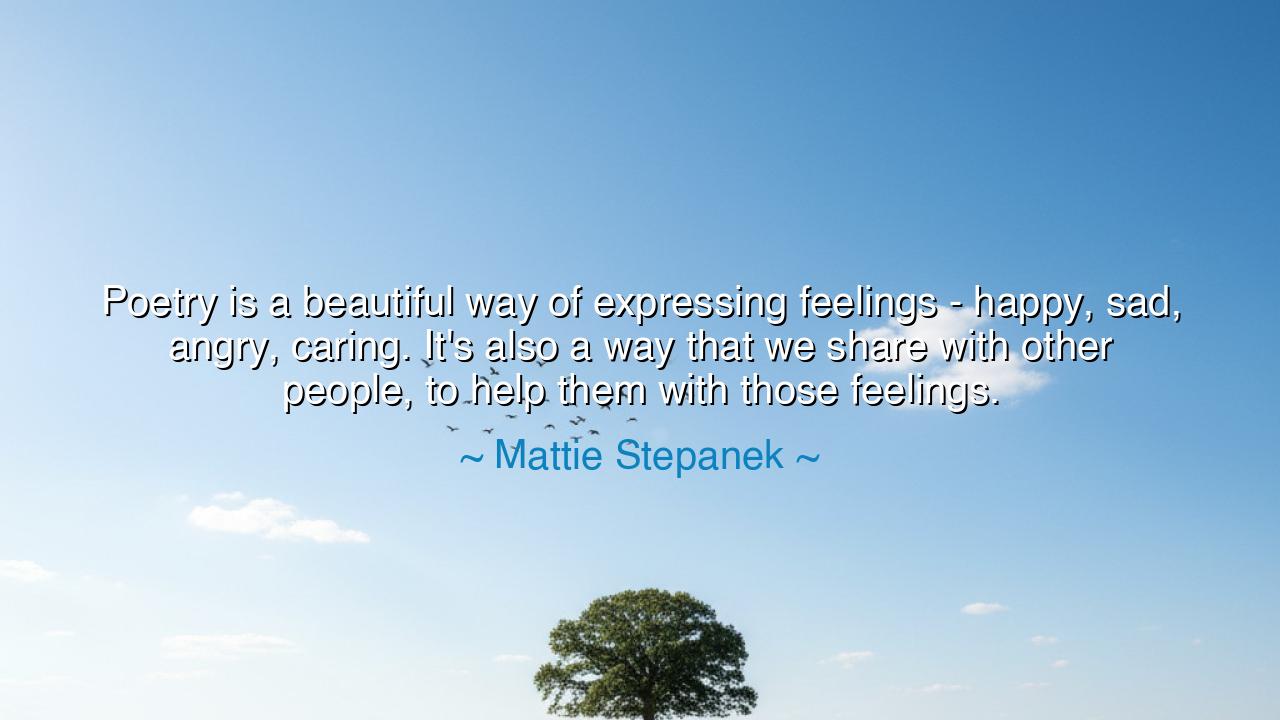
Poetry is a beautiful way of expressing feelings - happy, sad
Poetry is a beautiful way of expressing feelings - happy, sad, angry, caring. It's also a way that we share with other people, to help them with those feelings.






There is a purity and quiet wisdom in the words of Mattie Stepanek, who said, “Poetry is a beautiful way of expressing feelings — happy, sad, angry, caring. It's also a way that we share with other people, to help them with those feelings.” In this gentle truth, spoken by one so young yet so wise, lies the eternal purpose of art: not merely to express, but to heal. Poetry, in Mattie’s eyes, is not the craft of words, but the language of the soul. It is the bridge between hearts — the way one person’s private pain, joy, or hope becomes another’s comfort. Through verse, the unseen within us takes form, and in that sharing, both the poet and the reader are transformed.
The origin of this quote rests in the life of a child who lived with extraordinary courage. Mattie Stepanek, born with a rare form of muscular dystrophy, knew suffering not as an idea but as a daily companion. Yet from his frailty blossomed immense strength — the kind that does not shout but whispers truth. His poetry, written before his death at just fourteen, was filled with tenderness, faith, and compassion. He called his collections Heartsongs, for he believed that every person carried within them a song of feeling that could be sung through words. In this, he captured what poets from every age have sought: the sanctity of emotion shared with honesty and grace.
The ancients, too, held this reverence for poetry as medicine for the spirit. The Greek philosopher Plato wrote that poets are “the interpreters of the gods,” for they give voice to what ordinary language cannot. And the Roman philosopher Seneca declared that poetry “soothes the soul,” transforming turmoil into order. Even in ancient temples, poets were regarded as healers — not of the body, but of the heart. Like the sacred hymns of Orpheus, whose music could calm beasts and move stones, Mattie’s vision of poetry continues this divine lineage. He reminds us that when words arise from truth and love, they can lift others from despair and guide them toward light.
Consider the life of Anne Frank, who, hidden in an attic during the horrors of war, poured her fears and hopes into her diary. Though not verse in form, her writing was poetry in spirit — a cry from the darkness that still illuminates the hearts of millions. Like Mattie, she transformed sorrow into something luminous, proving that the act of sharing one’s inner world is itself a form of courageous compassion. Through her words, generations have learned that expression, even in confinement, is freedom. This is the power Mattie speaks of: to use language not as armor, but as a gift of empathy.
Mattie’s words also reveal a profound understanding of emotional truth. He reminds us that all feelings — not just joy, but also sadness, anger, and care — are worthy of voice. The ancients would call this balance, the harmony of opposites. Just as the sun and moon share the sky, so too must our hearts embrace both light and shadow. Poetry becomes the sacred vessel in which these emotions coexist without judgment. It teaches us to face pain not with denial, but with reverence. For when sadness is spoken, it softens; when love is shared, it multiplies; and when anger is transformed into art, it no longer destroys — it enlightens.
In this way, poetry becomes a communal act, a form of shared healing. When a poet writes, they invite others into their soul — and those who read find their own reflections there. This is why Mattie’s message endures: poetry is not a solitary pursuit but a dialogue of humanity. Through it, strangers become companions in feeling; wounds become doorways to understanding. It is the most ancient of bridges — built not of stone, but of empathy. To write or to read poetry is to affirm that no one is truly alone in their emotions.
The lesson, my children, is both simple and eternal: speak your heart, and listen to the hearts of others. Whether through poetry, song, or simple words, do not imprison your feelings behind silence. Expression is not weakness — it is wisdom. Let your words comfort, inspire, or simply be. For as Mattie teaches, poetry is not only about beauty — it is about connection. To share one’s emotions is to weave oneself into the tapestry of humanity.
And so, remember Mattie Stepanek, the boy who sang from a frail body with a mighty heart. His truth stands as a timeless law: that poetry — born of sincerity, nurtured by emotion, and shared in love — is one of the greatest powers given to humankind. Use it not only to reveal yourself, but to heal others. For when you dare to write your heartsong, the world becomes quieter, kinder, and infinitely more alive.






AAdministratorAdministrator
Welcome, honored guests. Please leave a comment, we will respond soon